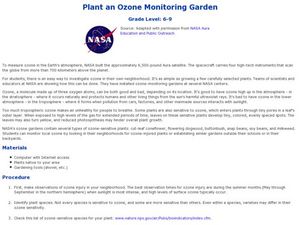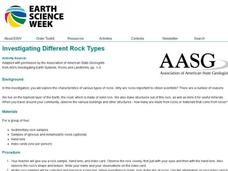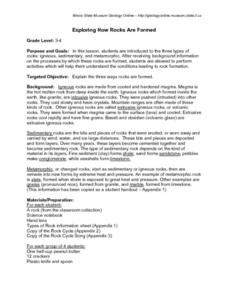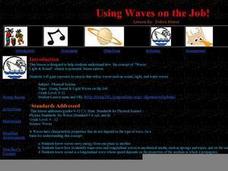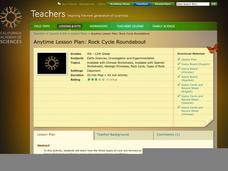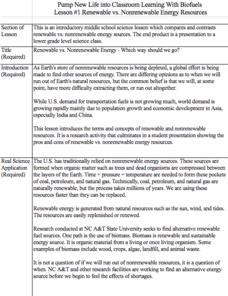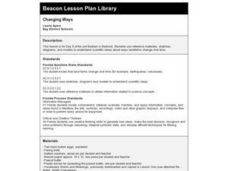Curated OER
Types And Magnitudes Of Earthquakes
Learners investigate the concept of earthquakes and the different types of magnitudes. They research the Richter scale and how it is used to measure the intensities of earthquakes. Students then apply the concept by completing a...
Curated OER
The Effects Of Earthquakes
Students investigate the concept of how earthquakes occur and the after effects of how they effect landforms. They conduct research it using a variety of resources and measure the varying intensities of how earthquakes effect the...
Curated OER
Plant an Ozone Monitoring Garden
Students create a garden. In this ozone lesson, students discuss ozone injury, identify plants sensitive to ozone, and then plant their own ozone garden.
Curated OER
Frogs Frogs Frogs
Students view a disk on the continental movement and analyze the given data on fossils, rock types and climate zones. In this geology lesson students draw a diagram of the earths layers, take a quiz complete a PowerPoint presentation.
Curated OER
Pollution - What is It Doing to Us?
Students recognize some forms of pollution. In this science lesson plan, students recognize and understand some of the devastating effects of the acid rains and other possible factors that are contrary to the pH balance of nature.
Curated OER
Investigating Different Rock Types
Students analyze a rock using their eyes and then a hand lens. In this science lesson plan, students determine and discuss how hard or how easy it was to find and classify the assigned rock. Students record their observations on an...
Curated OER
Weather Tools
Pupils explore Earth science by participating in a weather identification activity. In this scientific instrument lesson, students identify several weather related tools such as the weather vane, thermometer and rain gauge. Pupils...
Curated OER
Core
Eighth graders examine conditions that can lead to the formations found and correlate the layers. In this rock layers lesson students complete an activity that allows students to take their own "core sample".
Curated OER
A Model of the Sea-floor
Young scholars create a paper model to illustrate sea-floor spreading.
Science 4 Inquiry
Edible Plate Tectonics
Many people think they can't observe plate tectonics, but thanks to GPS, we know that Australia moves at a rate of 2.7 inches per year, North America at 1 inches per year, and the Pacific plate at more than 3 inches per year! Scholars...
Curated OER
Exploring How Rocks Are Formed
These lessons produced by the Illinois State Museum are quite good. In this one, third and fourth graders are introduced to the three basic types of rocks: igneous, sedimentary, and metamorphic. They perform activities which help them...
Curated OER
The Formation of Coal
In this coal formation worksheet, students read and informational sheet about coal formation. Students are given 5 short-answer questions regarding what they've read.
Curated OER
Using Waves on the Job!
A colorful and comprehensive PowerPoint highlights this lesson on waves. Junior geophysicists pretend that they are hired to analyze seismic waves. A worksheet is provided to go along with an online article about how compact discs work...
Curated OER
Plotting Earthquakes
Students plot earthquakes on a map. In this lesson on earthquakes, students will explore recent earthquake activity in California and Nevada. Students will plot fault lines and earthquake occurrences on a map.
California Academy of Science
Rock Cycle Roundabout
After a basic introduction to the rock cycle and the three main types of rocks, young geologists can deepen their understanding of how rocks change through a fun learning game. Based on the characteristics and events shared by a reader,...
Curated OER
Snack Tectonics
Yum! Using graham crackers, dried fruit sheets, and frosting, tectonics technicians demonstrate the different types of plate boundaries. If you want to encourage youngsters with an activity that is both educational and edible, then this...
Kenan Fellows
Renewable vs. Nonrenewable Energy Resources
Is one type of energy inherently good or bad? Young scientists explore energy resources in a week-long unit. After extensive research, groups create powerful position statements and presentations supporting their energy resource of choice.
California Academy of Science
Discovering Rainforest Locations
How many rainforests are there, where are they, and do global factors effect their locations? These are great questions that have great answers. Children in grades four through eight use several different maps to determine why...
Curated OER
Air Quality Issues
Learners study and chart the levels of the atmosphere. They determine volume and location of the whole in the ozone layer by problem solving and drawing Antarctica.
Curated OER
Changing Ways
Third graders examine hard boiled eggs as possible models for the earth's layers.
Curated OER
Musical Plates
Sixth graders engage in a study of the plates and how they are part of the formation of the ever changing landscape of planet earth. They access web sites that have applications for observation and conducting different activities. The...
Curated OER
Science: What Happens to Create the Lode?
Students understand how mineral deposits are formed and why they are not evenly dispersed. They create and describe three different precipitates from four solutions simulating mineral ore deposit formation in sedimentary rock.
Curated OER
Air Quality and Transportation
Second graders study about air pollution and the effects it has on our Earth. Students tally cars on a sheet that has been categorized as follows: One person in car, two persons in car, or three or more persons in car. Students go to...
Curated OER
Mountain Building
Teacher prepares four layers of Plasticine stacking layers on top of each other to create a model of how rocks within the earth can be folded creating anticlines and synclines below the surface and mountains and valleys on the surface.
Other popular searches
- Science Earth Layers
- Science Earth's Layers
- Earth Science Layers of Earth
- Earth Science Earth's Layers
- Earth Science Earth Layer
- Science Earths Layers




